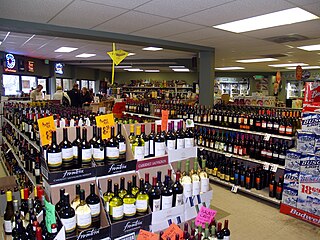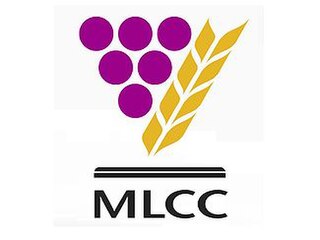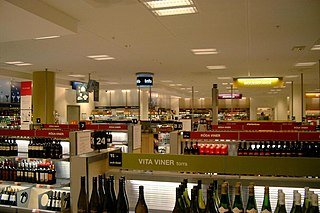
Whiteclay is an unincorporated community and census-designated place in Sheridan County, Nebraska, United States. The population was 10 at the 2010 census.

John Walter Jones was a politician and farmer in Prince Edward Island, Canada. An agronomist, he was instrumental in introducing the potato crop to the island, which was to become a staple of the economy. In 1935, he received the King George V medal as the best farmer in the province.

The Liquor Control Board of Ontario is a Crown corporation that retails and distributes alcoholic beverages throughout the Canadian province of Ontario. It is accountable to the Legislative Assembly through the minister of finance. It was established in 1927 by the government of Premier George Howard Ferguson to sell liquor, wine, and beer. Such sales were banned outright in 1916 as part of prohibition in Canada. The creation of the LCBO marked an easing of the province's temperance regime. By September 2017, the LCBO was operating 651 liquor stores.

The Société des alcools du Québec is a provincial Crown corporation and monopoly in Quebec responsible for the trade of alcoholic beverages within the province.
The Jim Pattison Group is a Canadian conglomerate based in Vancouver. In a recent survey by the Financial Post, the firm was ranked as Canada's 62nd largest company. Jim Pattison, a Vancouver-based entrepreneur, is the chairman, CEO, and sole owner of the company. The Jim Pattison Group, Canada's second largest privately held company, has more than 45,000 employees worldwide, and annual sales of $10.1 billion based on investments in Canada, the U.S., Mexico, Europe, Asia and Australia. The Group is active in 25 divisions, according to Forbes, including packaging, food, forestry products.

A liquor store is a retail shop that predominantly sells prepackaged liquors – typically in bottles – usually intended to be consumed off the store's premises. Depending on region and local idiom, they may also be called an off-licence, bottle shop / bottle-o liquor store (US) or other similar terms. Very limited number of jurisdictions have an alcohol monopoly. In US states that are alcoholic beverage control (ABC) states, the term ABC store may be used.

The Oregon Liquor and Cannabis Commission (OLCC), formerly known as Oregon Liquor Control Commission is a government agency of the U.S. state of Oregon. The OLCC was created by an act of the Oregon Legislative Assembly in 1933, days after the repeal of prohibition, as a means of providing control over the distribution, sales and consumption of alcoholic beverages. To this end, the agency was given the authority to regulate and license those who manufacture, sell or serve alcohol. Oregon is one of 18 alcoholic beverage control states that directly control the sales of alcoholic beverages in the United States. In 2014, the passage of Oregon Ballot Measure 91 (2014) legalized the recreational use of marijuana in Oregon and gave regulatory authority to the OLCC.
Alcoholic beverage control states, generally called control states, less often ABC states, are 17 states in the United States that, as of 2016, have state monopoly over the wholesaling or retailing of some or all categories of alcoholic beverages, such as beer, wine, and distilled spirits.

The Manitoba Liquor Control Commission (MLCC) was a Crown corporation mandated with regulating, distributing, and selling beverage alcohol in the Canadian province of Manitoba. In 2014, the Manitoba government merged MLCC with the Manitoba Lotteries Corporation to form the Manitoba Liquor & Lotteries Corporation.

The Alberta Gaming, Liquor and Cannabis Commission (AGLC) is an agency of the government of the Canadian province of Alberta, and regulates alcoholic beverages, recreational cannabis, and gaming-related activities. References to cannabis were added to AGLC's name and governing legislation as cannabis in Canada moved towards legalization in 2018. AGLC was created in 1996 as the Alberta Gaming and Liquor Commission by combining the responsibilities and operations of the Alberta Liquor Control Board (ALCB), Alberta Lotteries, the Alberta Gaming Commission, Alberta Lotteries and Gaming and the Gaming Control Branch. The current acting Chief Executive Officer as of 2020 is Kandice Machado.
The Iowa Alcoholic Beverages Division is the alcoholic beverage control authority for the U.S. state of Iowa. Since March 8, 1934, it has regulated the traffic in, and maintained a monopoly on the wholesaling of, alcoholic beverages in the state, thus making Iowa an alcoholic beverage control state.
The Washington State Liquor and Cannabis Board, formerly the Washington State Liquor Control Board, is an administrative agency of the State of Washington. The Liquor and Cannabis Board is part of the executive branch and reports to the Governor. The board's primary function is the licensing of on and off premises establishments which sell any type of alcohol, and the enforcement and education of the state's alcohol, tobacco, and cannabis laws.
A liquor license is a governmentally issued permit to sell, manufacture, store, or otherwise use alcoholic beverages.
The Illinois Department of Revenue (IDOR) is the code department of the Illinois state government that collects state taxes, operates the state lottery, oversees the state's casino industry, oversees the state's thoroughbred and harness horse racing industries, and regulates the distribution of alcoholic beverages throughout Illinois, including beer, wine, and liquor. It is headquartered at the Willard Ice Building, 101 West Jefferson in Springfield, Illinois.

The Nova Scotia Liquor Corporation (NSLC) is the Crown corporation which controls sales of alcoholic beverages and recreational cannabis in Nova Scotia, Canada. It is the sole distributor for these products and runs all retail outlets selling alcohol and cannabis products. The exceptions are for four private retailers in urban HRM offering beer, wine, and spirits, and, in rural areas where there is not an NSLC location, 23 "agency" liquor stores operated by private retailers on NSLC's behalf.

An alcohol monopoly is a government monopoly on manufacturing and/or retailing of some or all alcoholic beverages, such as beer, wine and spirits. It can be used as an alternative for total prohibition of alcohol. They exist in all Nordic countries except Denmark proper, and in all provinces and territories in Canada except Alberta. In the United States, there are some alcoholic beverage control states, where alcohol wholesale is controlled by a state government operation and retail sales are offered by either state or private retailers.
Crown corporations in Canada are government organizations with a mixture of commercial and public-policy objectives. They are directly and wholly owned by the Crown.
The Nunavut Liquor and Cannabis Commission regulates the distribution, purchase and sale of alcoholic beverages and cannabis in the Canadian territory of Nunavut. The retail arms is referred to as Nunavut Liquor Management. It is the smallest and newest liquor control agency in Canada.

On October 17, 2018, cannabis was legalized in Canada for recreational and medical purposes. It was already legal for medicinal purposes, under conditions outlined in the Marihuana for Medical Purposes Regulations issued by Health Canada, and for seed, grain, and fibre production under licence by Health Canada.
The COVID-19 pandemic in Prince Edward Island is part of an ongoing global pandemic of coronavirus disease 2019 (COVID-19), an infectious disease caused by severe acute respiratory syndrome coronavirus 2 (SARS-CoV-2). The Canadian province of Prince Edward Island has the fewest cases of COVID-19 in Canada in provinces, and currently remains the only province in the country to have not reported any deaths. As of July 6, 2021, Prince Edward Island has reported 207 confirmed cases of the virus, 206 of which have resolved. As of that date, 28,653 tests have come back negative and 84 are currently under investigation. On March 14, 2020, the first confirmed case in Prince Edward Island was announced, a woman in her 50s who had returned from a trip on a cruise ship on March 7. By March 26, 2020, there were five cases, all of which had been travel related, i.e., been contracted while persons were abroad. To date, there was no re-transmission reported in the island province.











